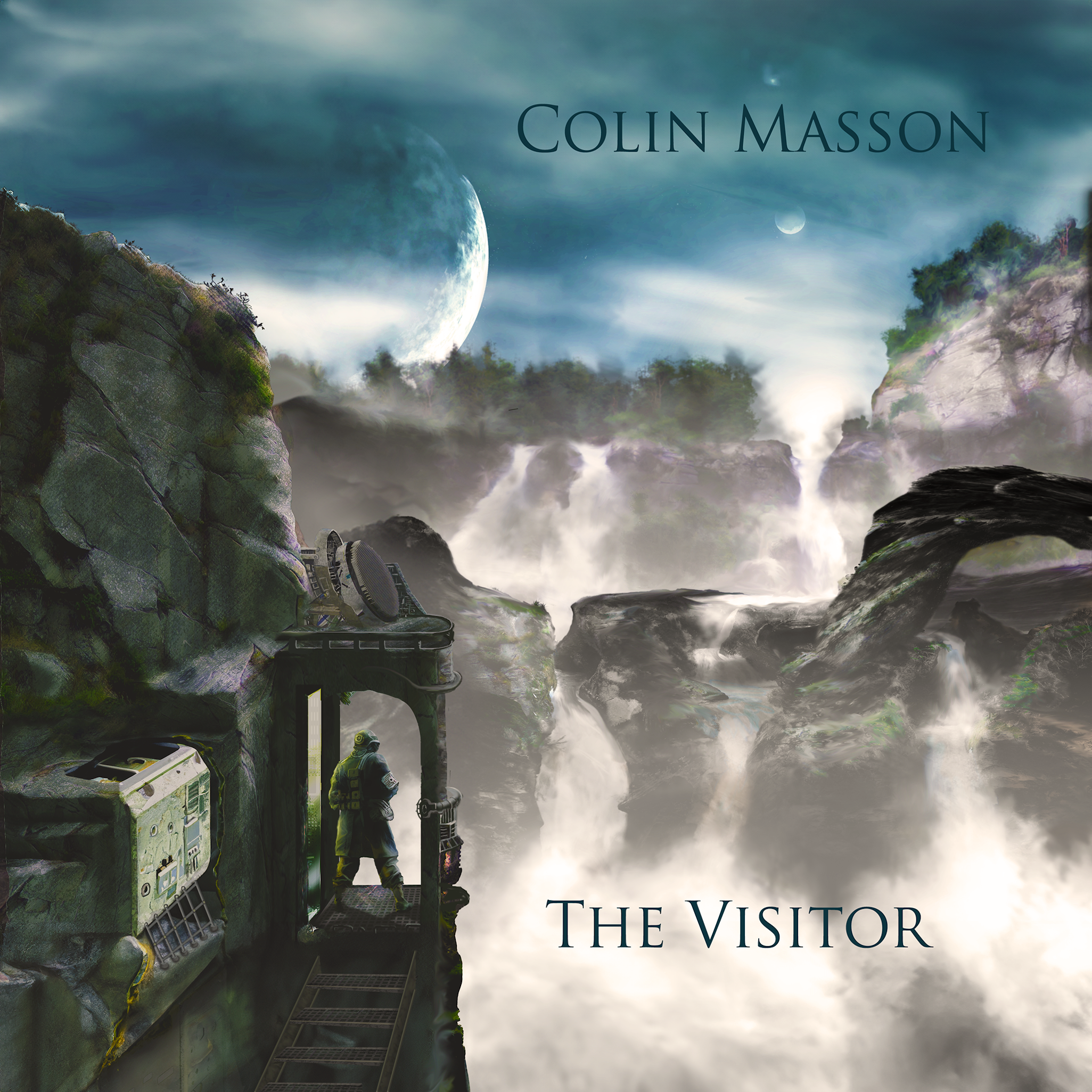
Two albums in less than a year! My goodness, Mr. Masson is motivated to say the least. The rather resplendent “Echoes of Albion” was release on February 10, 2024, with a triumvirate of massive pieces well into the double digits that got the full five-star review treatment, without any hint of doubt or apology. “The Visitor” ventures out into a more electronic and I daresay, somewhat gloomier realm, as the Celtic beauty has been now replaced with a somewhat more bruising avenue and much darker substance. According to my observations over this period, I guess when a few decades of unchecked apathy turns slowly into extremist irrationality, the price one must pay is to get, willingly or not, ready for the new world of the upcoming AI generated wilderness of expertly algorithmic deceptions. Yes, children of the universe, the word “why” is about to be deleted anytime now soon, due to an eventual lack of time allotted to such an ineffective premise. There is even talk of ending book publishing and thus reading, because of the negative pollution it provides (mainly the dust gathering on the dilapidated shelves). We also can see Love being rapidly replaced by endless and automatic likes. The good news is that the patented massive epic style is now firmly entrenched as this album has only four tracks, ranging from the 21.14-minute opener “Helvetia” to the finale “Spered Hollvedel”, lasting an orderly 8.26 minutes. An hour of smoulderingly intense music is on display.
“Helvetia” is the original Latin /Roman name of the tribe that lived in the area what is today Switzerland, and the cinematographic treatment given to this gorgeous Alpine enclave is expertly composed by Colin Masson, who inserts a colossal number of electronic keyboards and synthesizers in building up the arrangement to celestial heights, with peaks worthy of the Matterhorn, Eiger, Jungfrau or Dufourspitze. The icy beauty of the interweaving melodies is a testament to the inspiration that pretty much every square inch that the Helvetic Confederation can offer. Windswept and echo-laden sceneries, with edelweiss sprouting from the glacial ridges, cowbells in the distant valley, this clean and prosperous essay in musical dynamics is perturbed by Masson’s energetic electric guitar rides, emerging from endless tunnels of luxuriant sound. When the ambient, nearly Vangelis-like excursions into introspection kick in, it is almost a form of relief from the preceding avalanche of emotions. Masson’s psychedelic twirling on the fretboard offers a harder edge to his usual Celtic/Oldfield style, a trait throughout this raw album, proving that this is not an artist stuck in formulaic mode, actually progressing further and beyond whenever possible. When the rumbling bass guitar muscles in on the final section of the arrangement, the bliss becomes overwhelming. A masterful exercise in modern music composition and instrumental expertise, bar none.
Having been fortunate to spend my high school years in the Swiss education system, I got to witness at an early age the notion of direct democracy, a form of socio-political government whereby the people vote in plebiscites on a variety of issues instead of having an elected representative decide what needs to be accomplished and how (sadly, more often not done very well). Based on the 1000 city states that composed the Greek civilization and reprised by the Italian Renaissance, it may be a more ‘involved’ and educated society when the people decide their fate and not their elected prima donnas. So, when the next track “The Nature of Evil” bullies itself sonically into the current binary (left or right) debate, it should come as no surprise that this nasty, blood curdling composition, fully adorned with speeches by a couple of ‘leaders’, past and present only seeks to highlight the current insanity of a world that has only 2 colours: grey and gray. As the heavily lumbering obese steamroller shifts into gear, the two-note onslaught begins its slow assault on the senses, crippling the mind and aggressing the energy with endless faceless opinion-peddling by all sides, as if nothing more exists than two sides of the same coin. The bright colours of the universe are definitely gone in this arrangement, it’s a sonic criticism of the current moribund, pathetic, feeble, and ineffective forms of government pretty much everywhere on the planet, from all sides of the spectrum and the sombre music certainly paints an ugly picture. This is easily the ‘dirtiest’ track I have heard this year; a long luxuriant bath may be needed after this and a Toblerone to wash away the soot.
“The Bones of the Mountain “is the second megalodon here, clocking in at a paltry 19 minutes and 59 seconds, and surely a more comfortable zone than the two preceding blockbusters. Firstly, the acoustic guitar reverberates in a more bucolic setting, reflecting the Celtic prog tendencies that have marked Colin’s long solo career and his splendid years with the Morrigan. Needless to state, it’s a welcome relief, as the warm, spiritually infused musings soothe the bruised psyche like only great music can, a panacea for all our troubles, real or imagined. The restrained pace is remarkable at first, as the evolution towards bigger melodies and more punch is gently raised without too much turbulence. His mastery over the electric guitars is exhilarating, every note meaningful and yet audacious. The transition into parallel realms is intoxicating, as he makes his guitar cry, sob, heave and bellow, a remarkable touch without ever falling into redundancy, underling it all with deft drums support, the usual buzzing bass and some thrilling organ adornments. As the aural ascent becomes more arduous, the pauses for effect become necessary, at times playfully eccentric, and even hypnotic and at others, deeply introspective. The final section evolves into a complex, prog-folk symphony that has been the hallmark of his passion for may decades now.
The serene “Spered hollvedel » («universal soul») is a traditional Brittany composition from famed Celtic maestro Alan Stivell. The music comes from ancient folk songs based on Sainte Marie de Rostrenen (Itron Varia Rostren) and for Sainte Anne by Jeff Le Penven (Kantig Santez Anna). The traditional Breton roots are at the forefront here once again in full regalia, an homage to a marvelous tradition that keeps going strong despite all the swift noise. The elegant recorders exude a magic that can only be found in this solemn style, both reverential and subdued, yet oozing emotion and utter accomplishment. The main melody is simple and simply beautiful, a sheer joy for the ears, the mind and the soul connect to it all. As the electric guitar retraces the grandiose theme, the nail is gently hammered snugly, a mesmerizing composition that serves to complete (and not compete with) the previous tracks, as it’s a fitting climax to a wonderful visit in the brilliant world of Colin Masson.
Both “Echoes of Albion” and ‘the Visitor”, unified TOGETHER as one and will be placed high on my top 5 for 2024 list .
5 gentle tourists








